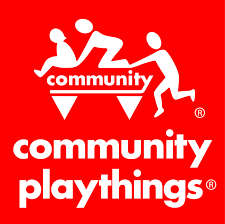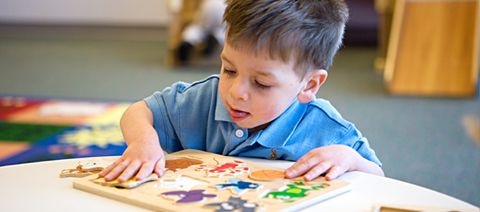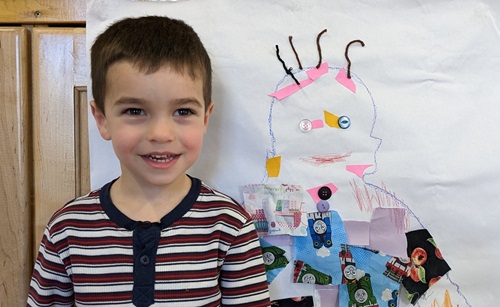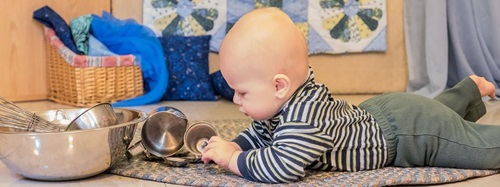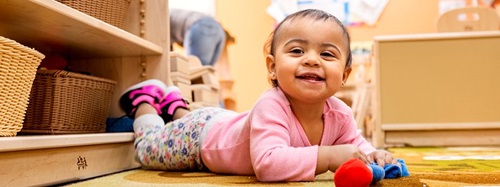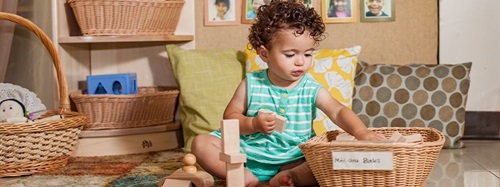Figuring Out the World
| September 2011Toddlers naturally play as a way of making sense of the world, themselves, and others. Their play is unique from play at older ages. Play lets them figure things out without regard to rules or boundaries. The spontaneous and repetitive nature of their play allows them to try out and master new skills. When a new skill is mastered, the toddler has a feeling of, “I did it!” spurring them on to try other things and play more.
Toddler play is bathed in the developmental tasks of this age—separation, emerging sense of self, experiencing new emotions, and developing language skills. As toddlers separate from their primary caregiver, they begin to develop a sense of self as an active agent in their environment. Less dependency means more trying it out ‘on-my-own’. A new awareness of the world around them propels a desire to know the world on their own terms. From here arises the toddlers’ insatiable and vibrant curiosity. Yet, discoveries remind toddlers that the world is a big place. As they venture out, they need reassurance that their safe base (mommy/daddy) is available. Play provides a realm to work out the back and forth of independence and dependence, and exploration and discovery.
The underlying force in toddler play is figuring-it-out. This article addresses the nature of toddler play, what is being figured out, how and why they play, and ways to support them.
Toddler Play is Open-ended
Toddler play is less rule-bound and more in the moment than it is for older children. Playing involves exploring and discovery, as the toddler drive is to make sense of the world. An object suddenly catches the toddler’s eye and soon the exploration starts, ‘What is this?’ ‘What can I do with it?’ She picks it up and begins to play.
Trying things out—“What happens if…”—is central to their play, illustrated by toddlers pushing, pulling, putting items inside of containers, and taking them out, over and over again. For toddlers, possibilities are endless, leading to inventive uses of materials.
Toddlers also spend time watching and imitating the actions of others—parents, siblings, and peers. As they gain symbolic capacities, including increased language abilities, play becomes more pretend-focused and interactive with peers, a change most noticeable after age 3. Pretend provides another realm for figuring-it-out.
What are Toddlers Figuring Out?
Toddler play is about making sense of what surrounds them, how things work, who they are, and what experiences in their lives mean.
For toddlers, the world is big, filled with novel experiences. Order, repetition and routines instill comfort. Like the example above, toddlers repeat an action again and again until the task feels complete. A toddler may play with a train, on the same track, in the same order, every morning, finding calm in the routine of the known. Or they may use a single colored crayon for days on end before changing to a new color. Physically, the toddler who has just learned how to climb up the steps to a slide may do this over and over. Repetition becomes mastery. Mastery leads to feeling secure.
Figuring out Me!
Toddlers are figuring out what it means to be their own person, separate from mommy and daddy: “Who am I?” The discovery of self includes having one’s own desires and becoming an active agent, “I can make things happen!” Not surprisingly, much of their play is steeped in this developmental task.
Toddlers often need to have-it-all. There is great satisfaction in collecting and carrying objects—filling baskets or cloth bags with small toys, pushing toy strollers filled with more than just baby dolls. Their collections can range from cars, small blocks or animals to sticks, rocks or toilet paper rolls.
Learning about ‘Who I am and what I want’ is the essential first step before a child can recognize the needs and wants of others. What looks selfish is actually part of becoming ‘Me!’ By collecting what she sees or desires, the toddler is saying, “This is mine. This is what I need and like right now.” Fulfilling her needs provides the toddler with security and comfort, a necessity before they can recognize and reach out to others.
Figuring out what their bodies can do is another aspect of self. Climbing, running, jumping and throwing all test rapidly developing skills. Tactile experiences support physical discovery—sinking hands into finger paints to paint arms, squishing it in her hands, touching it onto the table. The toddler discovers what she can do with the paint, how touching the table with paint turns it a new color, and discovering the feel and look of it on her body. Toddlers waddle in mud puddles, pour sand over their hands, splash water or mush play dough, all as part of exploratory tactile play.
In exploring their bodies, toddlers attempt actions that appear absurd to adults. A toddler may try to fit her body into a small box or ride on a tiny toy truck, as a way of figuring out their body.
With each action, toddlers figure out their impact on the environment.
By physically defining space and saying no, as well as repeating a task over and over again, the toddler gains mastery and control. This is done in numerous ways.
By being the mommy or daddy and putting the baby doll or animals to sleep, the toddler controls who goes to sleep and when. A toddler pushes a button and watches balls roll around, or sends a car down a wooden ramp repeatedly. Each action shows the toddler their impact and builds feelings of competence.
Figuring out Separation and Emotions
Toddler play is about mastering separation and figuring out emotions. As the toddler ventures further out on their own, they need to know they can count on their caregiver being available to them when needed. Competency develops only if they develop trust in their parent or caregiver as a secure base. By learning that leaving is only temporary, and trusting that the caregiver always returns, the toddler feels secure. Games such as peek-a-boo, hide-and-seek, or hiding and finding toys all reinforce that what goes away, comes back.
In their play, toddlers control the leaving and returning, hiding and finding. The glee upon being found time and again in hide-and-seek is evidence of the emotional base of this game. Toddlers play leaving games using their emerging pretend skills, “I going to store. Bye-bye.” As the leaver, the toddler decides when to go and return, rather than being left. They may comfort a doll or baby animal, assuring the baby (and self) that “Mommy comes back.” Toddlers like to push toys through tunnels, crawl through small spaces, open and close doors. These actions provide control and reminders that what disappears is not lost forever.
As separation proceeds, new emotions arise, from anger to sadness and fear. One toddler works through his sadness and anger after separating which frees him to begin his day at school.
Supporting play with simple props (i.e., puppets, dress up clothes and hats, open-ended materials like boxes) allows toddlers to work through emotions and life experiences. Here, a toddler plays out a sudden and frightening experience. Anger is a prominent emotion at this developmental juncture. Providing opportunities for toddlers to play out anger is key. Hammer toys and wood benches let them hammer away, “I am angry!” Puppets can express anger, which makes the emotion less threatening to the child, or the child can become an angry animal to express her feelings. Toddlers also experiment with the range of emotions through play.
Supporting Toddler Play
Toddlers look to the adults to provide a structured environment for play. This structure sets up a safe path; the toddler decides how and what to play on it. Toddlers play naturally, indoors and out. Open ended materials such as boxes and containers with lids, blocks, simple puzzles, natural materials (water, sand, dirt, leaves) and paints provide props. Materials to support pretend play can include puppets, scarves, simple dress up clothes and hats, kitchen set ups and utensils.
Toddlers thrive on predictability and routines. A consistent classroom set-up provides comfort and trust, upon which their play builds. The incredible curiosity of the toddler and desire to know the world on their terms drives toddler play.
Play allows them to figure out their newly discovered self, the world around them, their feelings and experiences as well as what goes together and comes apart. Figuring-it-all-out is the heart of toddler play.
